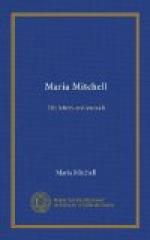“I had no hope, when I went to Europe, of knowing Mrs. Somerville. American men of science did not know her, and there had been unpleasant passages between the savants of Europe and those of the United States which made my friends a little reluctant about giving me letters.
“Professor Henry offered to send me letters, and said that among them should be one to Mrs. Somerville; but when his package came, no such letter appeared, and I did not like to press the matter,—indeed, after I had been in England I was not surprised at any amount of reluctance. They rarely asked to know my friends, and yet, if they were made known to them, they did their utmost.
“So I went to Europe with no letter to Mrs. Somerville, and no letter to the Herschels.
“I was very soon domesticated with the Airys, and really felt my importance when I came to sleep in one of the round rooms of the Royal Observatory. I dared give no hint to the Airys that I wanted to know the Herschels, although they were intimate friends. ’What was I that I should love them, save for feeling of the pain?’ But one fine day a letter came to Mrs. Airy from Lady Herschel, and she asked, ’Would not Miss Mitchell like to visit us?’ Of course Miss Mitchell jumped at the chance! Mrs. Airy replied, and probably hinted that Miss Mitchell ’could be induced,’ etc.
“If the Airys were old friends of Mrs. Somerville, the Herschels were older. The Airys were just and kind to me; the Herschels were lavish, and they offered me a letter to Mrs. Somerville.
“So, provided with this open sesame to Mrs. Somerville’s heart, I called at her residence in Florence, in the spring of 1858.
“I sent in the letter and a card, and waited in the large Florentine parlor. In the open fireplace blazed a wood fire very suggestive of American comfort—very deceitful in the suggestion, for there is little of home comfort in Italy.
“After some little delay I heard a footstep come shuffling along the outer room, and an exceedingly tall and very old man entered the room, in the singular head-dress of a red bandanna turban, approached me, and introduced himself as Dr. Somerville, the husband.
“He was very proud of his wife, and very desirous of talking about her, a weakness quite pardonable in the judgment of one who is desirous to know. He began at once on the subject. Mrs. Somerville, he said, took great interest in the Americans, for she claimed connection with the family of George Washington.
“Washington’s half-brother, Lawrence, married Anne Fairfax, who was one of the Scotch family. When Lieutenant Fairfax was ordered to America, Washington wrote to him as a family relative, and asked him to make him a visit. Lieutenant Fairfax applied to his commanding officer for permission to accept, and it was refused. They never met, and much to the regret of the Fairfax family the letter of Washington was lost. The Fairfaxes of Virginia are of the same family, and occasionally some member of the American branch returns to see his Scotch cousins.




